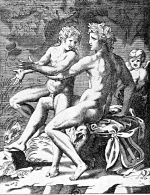Template:Portal:History:Ancient Greece: Difference between revisions
From BoyWiki
New page: {| style="width: 100%; margin-bottom:7px; border:1px solid #cedff2; padding:2px; background-color:#f5faff" |- bgcolor="#cedff2" |align="left" style="font-size:12pt; font-weight:bold; padd... |
No edit summary |
||
| (15 intermediate revisions by 2 users not shown) | |||
| Line 1: | Line 1: | ||
{| style="width: 100%; margin-bottom:7px; border:1px solid #cedff2; padding:2px; background-color:#f5faff" | {| style="width: 100%; margin-bottom:7px; border:1px solid #cedff2; padding:2px; background-color:#f5faff" | ||
|- bgcolor="#cedff2" | |- bgcolor="#cedff2" | ||
|align="left" style="font-size:12pt; font-weight:bold; padding:5px"| | |align="left" style="font-size:12pt; font-weight:bold; padding:5px"| [[Ancient Greece]] | ||
|- | |- | ||
|[[File:CARAGLIO Giovanni Jacopo 1530c Apollo e Giacinto 802x1042.jpg|thumb|right|150 px|[[Apollo]] and [[Hyacinth (mythology)|Hyacinth]]]] | |||
* [[Ganymede]] is the young, beautiful boy that became one of Zeus' lovers. One source of the myth says that Zeus fell in love with Ganymede when he spotted him herding his flock on Mount Ida near Troy in Phrygia. | |||
| | * [[Trochus/Hoop|The hoop]] held symbolic meanings in Ancient Greek myth and culture and was used to represent a boy or youth in general in Greek art. The Greeks referred to the hoop as the trochus or krikoi, and they were probably made of bronze, iron, or copper. | ||
*[[Hyacinth (mythology)|Hyacinth]] is a divine hero from Greek mythology and Apollo's young lover, a beardless youth. | |||
*[[Apollo (mythology)|Apollo]] is one of the most important and complex of the Olympian deities in classical Greek and Roman religion and mythology and is celebrated for having many young male lovers including Hyacinth and Cyparissus. Apollo is known as a great teacher and mentor of men and boys alike. | |||
|} | |} | ||
<noinclude> | <noinclude> | ||
[[Category: | [[Category:Templates portal history]] | ||
</noinclude> | </noinclude> | ||
Latest revision as of 11:02, 1 November 2014
| Ancient Greece |

|